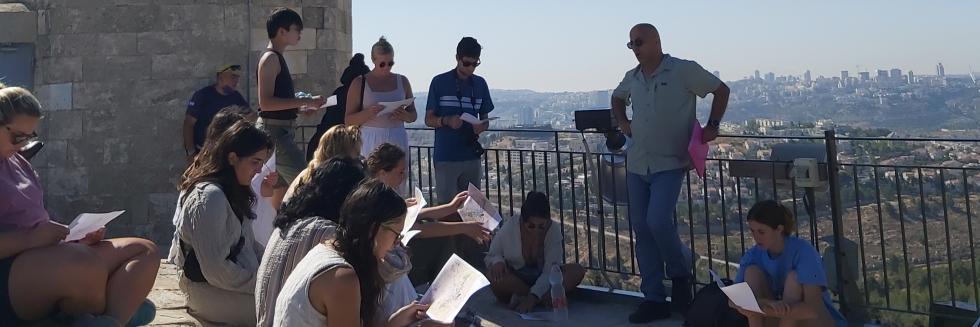Dr. Yusri Hazran
Areas of Expertise: Modern Lebanon, modern Syria, Middle Eastern minorities, Druze in the Middle East, Shia and Arab society in Israel, Hamas

Research Abstract
"What between Northern Iraq and Southern Sudan? Israel, Arabism, and the League of Minorities: A Reevaluation"
The state of Israel, like the Zionist movement before it, has always seen itself as facing an existential threat from its hostile surroundings. This state of mind cannot be divorced from the historical heritage of the Jewish people in Europe, which has been one of persecution and victimization. But it is also an expected outcome of the state of conflict between Zionism and the Arab world. Hence, seeking alliances with non-Arab nations and ethnic minority groups in the area was seen as a way to confront this challenge.
The topic and research questions
The purpose of this research project is to examine the phenomenon of the League of Minorities from a historical point of view, focusing on the early relations and cooperation between Israel and Zionism and with ethnic communities in the Middle East. Consequently, the study will address two questions. 1. Was the League of Minorities a dominant component of Israel’s policy vis-à-vis its Arab surroundings constituting a coherent strategy? Was the minorities’ response driven by instrumental or utilitarian considerations or was a cultural and ideological dynamic involved in shaping their behavioral patterns?
An overview of the literature
The large body of literature devoted to the issue of the League of Minorities deals with the issue in specific geographical and political locations, such as the Israeli involvement in northern Iraq or the "alliance” between Israel and the Druze community. Indeed, considerable numbers of journalistic and academic works have been published on various aspects of this issue, as the bibliography shows. But no study has yet provided a comprehensive perspective on the phenomenon, and its ideological and historical dimensions; equally important, no one has yet evaluated it thoroughly. This study aims to fill this gap in the scholarly literature on Israeli and Middle Eastern history, by gathering the many fragments into a complete historical model and examining the phenomenon from the viewpoints of both Israel and the minorities.
Discussion of main issues
This research project argues that, for decades, alliances with minority communities have been an important foundation of Israeli strategy vis-à-vis the Arab world; thus it contradicts the apologetic and ideologically-motivated arguments that deny that Israel has made a systematic policy of creating such alliances. In addition to drawing on Israeli archival sources, this argument is supported by materials the author has received from American and British archives, private sources and interviews with former Israeli officials. Furthermore, the study will show that Israel was involved in generating internal fragmentation and supporting separatist forces that share Zionism’s hostility to Arabism. The discussion will include Zionism’s historical ties with the Maronite community in Lebanon (1940s-1982), its support for the Kurdish national movement in Northern Iraq (1950s-1975), its involvement in Southern Sudan (following the 1967 war), and its efforts to mobilize and potentially move the Druze community in Israel to create a buffer state in the mountainous area separating Israel and Syria (following the 1967 war). The research will also address the question from the perspective of the minority groups, arguing that creating the state of Israel as a materialization of a minority group’s political aspiration enhanced the dynamics of separation and isolation amongst minority groups in the region and offered an alternative to assimilation and integration. These case studies will illuminate the ideological, historical, tactical, and strategic features of Israel’s alliance with non-Muslim and non-Arab communities.
Methodology
This study will use a historical approach of analyzing the issues under discussion. The study will be divided chronologically and thematically into three main parts. The first part will be comparative, drawing a comparison between the Israeli case and others taken from the colonial and post-colonial periods of the Middle East, such as the Iraqi levies during the British Mandate and the Islamic Republic of Iran’s relationship with Shiite communities in the Arab Middle East. The second part will address the period between 1920 and 1948, focusing in particular on the Zionist movement’s ties with the Maronite and Druze communities and the consolidation of the conception of the "League of Minorities.” The third part will examine the relationship and collaboration between Israel and some minorities in the region from 1948 up to the first Lebanon war of 1982, which might be considered the high point of this strategy.
Expected contribution
Based on readings of previously unused or underused primary sources, this study is the first, to my knowledge, to address the issue from all ideological and geopolitical angles. This study will address the issue from both sides, meaning the Israeli perspective and that of the minorities. Furthermore, it will provide a comprehensive review of this question in the fields of Israeli and Middle Eastern studies. Finally, although the League of Minorities’ doctrine did not achieve all of its goals, I will argue that the policy is still an important element in the Israeli strategy of national security and defense and that it continues to have broad historical significance.





